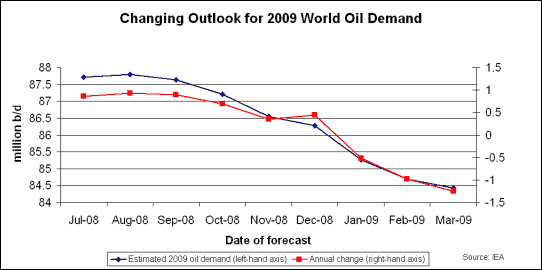Demand for oil in its many forms has been buffeted by the world's growing
economic malaise in recent months, and is now widely expected to fall by
more than 1 million b/d in 2009.
Changing outlook for 2009 world oil demand (million b/d)

The demand drop, which started late last year and could last into 2010, may
be the biggest the world has seen for a generation and is now being felt in
all corners of the world.
| We are looking at one of the biggest and fastest changes to the oil demand outlook the world has ever seen ... |
One of the most apparent aspects of the downturn has been the speed with
which it has taken place, and how rapidly this has forced forecasters to
slash their estimates of oil demand.
For example, as recently as September last year the International Energy
Agency was expecting world oil demand to rise by nearly 900,000 b/d in 2009.
Five months later, in its February 2009 report, the agency's projections had
done a complete about-face and were now pointing to 1 million b/d fall in
consumption.
In outright terms, the IEA has now reduced its estimate of demand this year
by more than 3 million b/d since it published its first projection in the
middle of 2008.
By comparison, during the Asian economic crisis of 1998, the last big
economic downturn to hit oil demand, the agency only reduced the same figure
by around 1.46 million b/d.
These projections are not unique to the IEA, with other market-watchers
seeing at least as big a fall, and some painting an even gloomier picture.
Clearly, then, we are looking at one of the biggest and fastest changes to
the oil demand outlook the world has ever seen, and it is no surprise that
in the physical oil market it is leading to a noticeable drop in demand for
crude oil from refiners.
In terms of the regional impact, the areas where demand destruction
have been occurring initially correlated fairly closely with the general
macro-economic slowdown, with most of the gloom coming from the developed
countries which make up the OECD.
The IEA, whose members make up the bulk of the group, expects demand from
the OECD to fall by as much as 1.6 million b/d this year.
Some of this is not new, as demand in many western European countries has
been essentially stagnant or even falling slightly for a number of years,
but the size of this year's expected contraction is unprecedented.
Just as the financial collapse in the western world is proving increasingly
contagious to the rest of the world, evidence has also been growing of oil
demand proving less robust than expected in many parts of the world outside
the OECD.
Although the OECD still consumes the majority of the world's oil, non-OECD
countries have been responsible for almost all the growth in oil demand in
over the last few years, so any serious slowdown there will be keenly felt
in the crude market, one of the world's most global commodity markets.
It is also worth looking at which refined product categories have been
particularly hard hit.
Perhaps unsurprisingly, transport fuels stand out as one obvious area, with
hard-hit consumers in the western world driving less and flying less than
they were a year ago.
Global trade has also fallen sharply, which has an immediate impact on the
amount of fuel oil needed as bunker fuel to power ship's engines across the
world's oceans.
The trade drop also goes further than that. As analysts Newedge pointed out
in a February report, as there is a near-perfect correlation in recent years
between container trade through US West Coast ports and total demand for
diesel in the whole of the US.
In other words, if fewer Asian goods are arriving in California, the US will
need fewer trucks to distribute those imports around the country.
And if people are buying fewer goods, then factories will be making fewer of
them, which again has a direct impact on energy demand of one form or
another.
Demand for petrochemical products, often seen as a better barometer of the
world's general financial health than any other commodity, has been battered
in all of the major regions, pushing some of the biggest players into
financial difficulties.
So don't look to naphtha and other petrochemical feedstocks to lead total
oil product demand on an upwards path just yet.
In March one of the key inter-regional arbitrages opened to spur the flow of
naphtha from Europe to Asia, but this was more due to the weakness of the
European market than any notable strength in Asia.
With weakness across the barrel, refining margins have also taken a hit,
leading to reports of run cuts at several of the less complex refineries.
With most economic pundits still unable to predict with any confidence when
the world's economic gloom might start to lift, it's hard to believe we have
heard the end of the bad news for oil demand just yet, with most people
expecting more pain, and possible deeper run cuts for refiners, in the
months ahead.
|